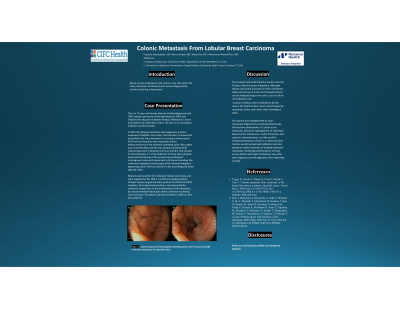Tuesday Poster Session
Category: Colon
P3156 - Colonic Metastasis From Lobular Breast Carcinoma
Tuesday, October 24, 2023
10:30 AM - 4:00 PM PT
Location: Exhibit Hall

Has Audio
- MK
Marina Kelada, MD
Connecticut Institute for the Communities
Danbury, Connecticut
Presenting Author(s)
Prabasha Weeraddana, MD1, Marina Kelada, MD2, Wenli Gao, MD1, Mohammad Ahmed-Khan, MD1
1Danbury Hospital, Danbury, CT; 2Connecticut Institute for the Communities, Danbury, CT
Introduction: Breast cancer metastasis to the colon is rare. We report the colon metastasis of lobular breast cancer diagnosed by routine screening colonoscopy.
Case Description/Methods: This is a 71-year-old female who has initially diagnosed with T2N1 lobular carcinoma of the right breast in 2002 and treated with adjuvant radiation therapy. Metastasis to bone and bladder was detected in 2013. she was on an aromatase inhibitor and denosumab. In 2015 left adnexal metastasis was diagnosed, and she underwent TAH/BSO. Since then, she has been on fulvestrant and palbociclib. She underwent a screening colonoscopy in 2019 and was found to have metastatic breast adenocarcinoma in the proximal ascending colon. No surgery was recommended, and she was closely monitored with colonoscopy and CT abdomen every six months. She refused IV chemotherapy. CT of the abdomen at three years showed bowel wall thickening of the proximal ascending and rectosigmoid colon with mesenteric soft tissue stranding. She underwent repeated colonoscopy, which showed malignant-appearing, severe intrinsic stenosis in the ascending and distal sigmoid colon. Biopsies were positive for metastatic lobular carcinoma and were negative for ER, HER-2, and PR was weakly positive. Hotspot sequencing panels were positive for PIK3CA H1047R mutation. No surgical intervention is recommended by colorectal surgery due to the involvement of the mesentery but recommended endoscopic stent to alleviate ascending colon stricture. The patient started on Xeloda 1 week on and one week off.
Discussion: The stomach and small intestine are the common GI sites of breast cancer metastasis. Although lobular carcinoma accounts for 10% of all breast adenocarcinomas, it is the most frequent breast cancer metastasizing to the colon. Loss of cell-to-cell adhesions and tropism of lobular cells is believed to be the reason for lobular breast cancer more frequently metastasis to the colon than other histological types. Our patient was asymptomatic at colon metastasis diagnosis by screening colonoscopy. She became symptomatic in 2 years as her metastasis advanced. Management of colorectal breast cancer metastasis is under discussion, and systemic chemotherapy is usually used for widespread disease as there is no demonstrable median overall survival with palliative resection except for radical resection of isolated colorectal metastasis. Screening colonoscopy in a breast cancer patient with high-risk features may offer early diagnosis and management, thus improving survival.

Disclosures:
Prabasha Weeraddana, MD1, Marina Kelada, MD2, Wenli Gao, MD1, Mohammad Ahmed-Khan, MD1. P3156 - Colonic Metastasis From Lobular Breast Carcinoma, ACG 2023 Annual Scientific Meeting Abstracts. Vancouver, BC, Canada: American College of Gastroenterology.
1Danbury Hospital, Danbury, CT; 2Connecticut Institute for the Communities, Danbury, CT
Introduction: Breast cancer metastasis to the colon is rare. We report the colon metastasis of lobular breast cancer diagnosed by routine screening colonoscopy.
Case Description/Methods: This is a 71-year-old female who has initially diagnosed with T2N1 lobular carcinoma of the right breast in 2002 and treated with adjuvant radiation therapy. Metastasis to bone and bladder was detected in 2013. she was on an aromatase inhibitor and denosumab. In 2015 left adnexal metastasis was diagnosed, and she underwent TAH/BSO. Since then, she has been on fulvestrant and palbociclib. She underwent a screening colonoscopy in 2019 and was found to have metastatic breast adenocarcinoma in the proximal ascending colon. No surgery was recommended, and she was closely monitored with colonoscopy and CT abdomen every six months. She refused IV chemotherapy. CT of the abdomen at three years showed bowel wall thickening of the proximal ascending and rectosigmoid colon with mesenteric soft tissue stranding. She underwent repeated colonoscopy, which showed malignant-appearing, severe intrinsic stenosis in the ascending and distal sigmoid colon. Biopsies were positive for metastatic lobular carcinoma and were negative for ER, HER-2, and PR was weakly positive. Hotspot sequencing panels were positive for PIK3CA H1047R mutation. No surgical intervention is recommended by colorectal surgery due to the involvement of the mesentery but recommended endoscopic stent to alleviate ascending colon stricture. The patient started on Xeloda 1 week on and one week off.
Discussion: The stomach and small intestine are the common GI sites of breast cancer metastasis. Although lobular carcinoma accounts for 10% of all breast adenocarcinomas, it is the most frequent breast cancer metastasizing to the colon. Loss of cell-to-cell adhesions and tropism of lobular cells is believed to be the reason for lobular breast cancer more frequently metastasis to the colon than other histological types. Our patient was asymptomatic at colon metastasis diagnosis by screening colonoscopy. She became symptomatic in 2 years as her metastasis advanced. Management of colorectal breast cancer metastasis is under discussion, and systemic chemotherapy is usually used for widespread disease as there is no demonstrable median overall survival with palliative resection except for radical resection of isolated colorectal metastasis. Screening colonoscopy in a breast cancer patient with high-risk features may offer early diagnosis and management, thus improving survival.

Figure: Colonoscopy demonstrating ( A) ascending colon severe stenosis and (B) moderate stenosis at the sigmoid colon.
Disclosures:
Prabasha Weeraddana indicated no relevant financial relationships.
Marina Kelada indicated no relevant financial relationships.
Wenli Gao indicated no relevant financial relationships.
Mohammad Ahmed-Khan indicated no relevant financial relationships.
Prabasha Weeraddana, MD1, Marina Kelada, MD2, Wenli Gao, MD1, Mohammad Ahmed-Khan, MD1. P3156 - Colonic Metastasis From Lobular Breast Carcinoma, ACG 2023 Annual Scientific Meeting Abstracts. Vancouver, BC, Canada: American College of Gastroenterology.
